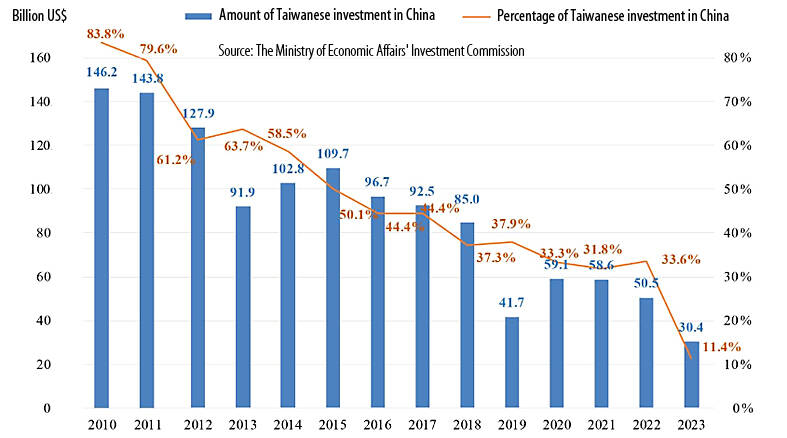Taiwanese businesspeople’s investments in China last year hit a record low of 11.4 percent of total foreign investment, the Mainland Affairs Council said yesterday.
The number was a huge decline from 83.8 percent in 2010, mainly because Taiwanese businesspeople have been diversifying their investments globally over the past few years, with great success, the council said.
From 1991 to last year, 45,523 Taiwanese investments in China totaling US$206.37 billion had been approved, accounting for 50.7 percent of overall foreign investment, data from the Ministry of Economic Affairs’ Investment Commission showed.

Photo: Screen grab from Mainland Affairs Council’s Facebook page
The amount and proportion of Taiwanese investments in China has been declining, with 328 investments last year totaling US$3.04 billion, a decrease of 39.8 percent from the same period a year earlier, the data showed.
Amid geopolitical upheavals and escalating trade and technology disputes between the US and China, Taiwanese businesspeople have adjusted their global layout strategy according to the restructuring of international supply chains, the council said.
They have reduced investment in China and increased investment in the US, Europe, Japan and countries covered by the government’s New Southbound Policy to diversify production risks, it said.
International institutions, including the World Bank, IMF, S&P Global Ratings and Goldman Sachs Group Inc, have predicted that China’s annual economic growth would not exceed 4 percent this year, it said.
Japan’s Nomura Securities Co said that China’s economy would face four major challenges: stagnant consumption, a sluggish housing market, slow foreign trade and overcapacity in emerging industries such as new-energy vehicles, the council added.
Separately, many Taiwanese businesspeople have lost hope in China’s economy under the governance of Chinese President Xi Jinping (習近平) and have formulated five-year plans to withdraw from the nation, an official familiar with cross-strait affairs said yesterday.
China’s business environment is continuing to deteriorate, while labor costs and taxes are increasing as a result of Xi’s “common prosperity” policy and the US-China trade dispute, they said.
Most legal advisers are telling Taiwanese in China to divest from the nation, the official said.
Taiwanese would not have considered pulling out of China if the economy was good, the person said, adding that they would keep a low profile regarding their plans to pull out of China for fear of retaliation from Beijing.
The Chinese economy is facing structural challenges, with a large number of unfinished buildings in several provinces and cities, and foreign businesspeople trying to leave China, the official said.
Serious deflation, insufficient consumer demand, a high unemployment rate and a high savings rate mean China’s economic recovery is weak, they said.
Hon Hai Precision Industry Co (鴻海精密) would find it difficult to withdraw from China, as its huge scale means any move it makes would have wide-scale remifications, the official said, adding that small and medium-sized enterprises have begun to slowly “transfer” to other countries or return to Taiwan.
Directorate-General of Budget, Accounting and Statistics data showed that Taiwan’s economic growth last year was 1.4 percent, which was not particularly impressive, analysts said.
However, Taiwan’s stock market remains bullish, mainly because Taiwanese businesspeople took their capital from China to invest it in the local stock market, they said.

SECURITY: As China is ‘reshaping’ Hong Kong’s population, Taiwan must raise the eligibility threshold for applications from Hong Kongers, Chiu Chui-cheng said When Hong Kong and Macau citizens apply for residency in Taiwan, it would be under a new category that includes a “national security observation period,” Mainland Affairs Council (MAC) Minister Chiu Chui-cheng (邱垂正) said yesterday. President William Lai (賴清德) on March 13 announced 17 strategies to counter China’s aggression toward Taiwan, including incorporating national security considerations into the review process for residency applications from Hong Kong and Macau citizens. The situation in Hong Kong is constantly changing, Chiu said to media yesterday on the sidelines of the Taipei Technology Run hosted by the Taipei Neihu Technology Park Development Association. With

A US Marine Corps regiment equipped with Naval Strike Missiles (NSM) is set to participate in the upcoming Balikatan 25 exercise in the Luzon Strait, marking the system’s first-ever deployment in the Philippines. US and Philippine officials have separately confirmed that the Navy Marine Expeditionary Ship Interdiction System (NMESIS) — the mobile launch platform for the Naval Strike Missile — would take part in the joint exercise. The missiles are being deployed to “a strategic first island chain chokepoint” in the waters between Taiwan proper and the Philippines, US-based Naval News reported. “The Luzon Strait and Bashi Channel represent a critical access

CARROT AND STICK: While unrelenting in its military threats, China attracted nearly 40,000 Taiwanese to over 400 business events last year Nearly 40,000 Taiwanese last year joined industry events in China, such as conferences and trade fairs, supported by the Chinese government, a study showed yesterday, as Beijing ramps up a charm offensive toward Taipei alongside military pressure. China has long taken a carrot-and-stick approach to Taiwan, threatening it with the prospect of military action while reaching out to those it believes are amenable to Beijing’s point of view. Taiwanese security officials are wary of what they see as Beijing’s influence campaigns to sway public opinion after Taipei and Beijing gradually resumed travel links halted by the COVID-19 pandemic, but the scale of

Pope Francis is be laid to rest on Saturday after lying in state for three days in St Peter’s Basilica, where the faithful are expected to flock to pay their respects to history’s first Latin American pontiff. The cardinals met yesterday in the Vatican’s synod hall to chart the next steps before a conclave begins to choose Francis’ successor, as condolences poured in from around the world. According to current norms, the conclave must begin between May 5 and 10. The cardinals set the funeral for Saturday at 10am in St Peter’s Square, to be celebrated by the dean of the College